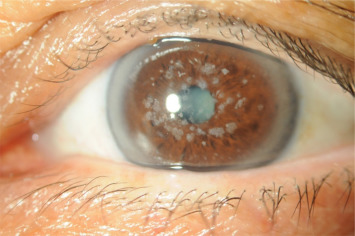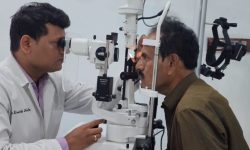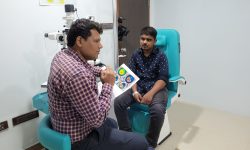Allergic conjunctivitis
Allergic conjunctivitis is a common eye condition that can affect both children and adults. It’s caused by an allergic reaction to substances such as pollen, dust mites, pet dander, or mold spores, leading to itchy, red, and watery eyes. This condition can impact your quality of life and may require medical attention.

Allergic conjunctivitis is a common eye condition that can affect both children and adults. It’s caused by an allergic reaction to substances such as pollen, dust mites, pet dander, or mold spores, leading to itchy, red, and watery eyes. This condition can impact your quality of life and may require medical attention.
Symptoms

Itchy Eyes
Itching is a common symptom, and you may find yourself rubbing your eyes frequently.

Redness
The eyes may appear red and bloodshot.

Watery Eyes
Excessive tearing is a typical symptom.

Swelling
The eyelids may become swollen, making the eyes feel uncomfortable.

Sensitivity to Light
Bright lights may cause discomfort.

Temporary Blurred Vision
Blurred vision may occur, but it usually resolves as symptoms subside.

Shield Ulcer
In some cases, allergic conjunctivitis can lead to the development of a shield ulcer, a large, severe corneal erosion that requires medical attention.
Diagnosis
Diagnosing allergic conjunctivitis involves a comprehensive eye examination by your eye care professional
Eye Examination

A thorough eye examination helps identify signs of allergic conjunctivitis.
Allergy Testing

In some cases, allergy testing may be recommended to identify specific allergens causing the reaction.
Treatments for Allergic Conjunctivitis
When it comes to treating allergic conjunctivitis, a combination of lifestyle changes, home remedies, and medical treatments can help provide relief
Lifestyle Changes and Home Remedies

Keep Windows Closed
During high pollen seasons, keep windows closed to prevent allergens from entering your home.

Wear Sunglasses
Sunglasses can protect your eyes from wind and allergens when outdoors.

Good Eye Hygiene
Avoid rubbing your eyes, as this can worsen symptoms. Wash your hands regularly to prevent transferring allergens to your eyes.

Use Artificial Tears
Lubricating eye drops can help rinse allergens from your eyes and provide relief.
Easy Treatment Options
- Antihistamine Eye Drops:These can help relieve itching and redness.
Difficult Treatment Options
Steroid Eye Drops:
In cases of severe allergic conjunctivitis, your doctor may prescribe steroid eye drops. These drops can provide relief from inflammation but should be used with caution and under medical supervision due to potential side effects.
Prescription Eye Drops:
If the symptoms are severe, your doctor may prescribe stronger antihistamine or anti-inflammatory eye drops.
Myths and Facts About Allergic Conjunctivitis
Myth
Allergic conjunctivitis is always seasonal.
Fact
While seasonal allergies are common, allergic conjunctivitis can occur year-round due to indoor allergens like dust mites and pet dander.
Myth
Allergic conjunctivitis is contagious.
Fact
Allergic conjunctivitis is not contagious it is caused by an allergic reaction, not an infection.
Myth
Only antihistamine eye drops can treat allergic conjunctivitis.
Fact
While antihistamine eye drops can help, prescription eye drops and other treatments may be necessary for more severe cases.
Myth
Avoiding outdoor activities can completely prevent allergic conjunctivitis.
Fact
While avoiding outdoor activities allergens can help, indoor allergens such as dust mites and pet dander can also trigger allergic conjunctivitis.
Causes and Risk Factors
Allergic conjunctivitis occurs when your eyes come into contact with an allergen, triggering an immune response. Common causes and risk factors include
Environmental Allergens:
- Pollen, dust mites, pet dander, and mold spores are common allergens that can trigger allergic conjunctivitis.
Seasonal Allergies:
- Allergic conjunctivitis may be seasonal, occurring during times of the year when pollen levels are high.
Irritants:
- Exposure to irritants like smoke, chlorine, or strong odors can worsen symptoms.
Family History:
- A family history of allergies can increase the risk of developing allergic conjunctivitis.
FAQs on Allergic Conjunctivitis
- An allergic reaction to substances such as pollen, dust mites, pet dander, or mold spores causes allergic conjunctivitis.
- No, allergic conjunctivitis is not contagious. It is caused by an allergic reaction and not an infection.
- Diagnosis involves a comprehensive eye examination, including medical history, eye examination, and possibly allergy testing.
- Treatments include antihistamine eye drops, prescription eye drops, avoiding allergens, and using cold compresses.
- Keeping windows closed, wearing sunglasses, practicing good eye hygiene, and using artificial tears can help manage allergic conjunctivitis.
- Yes, in some cases, allergic conjunctivitis can lead to a shield ulcer, a severe corneal erosion that requires medical attention.
- Take your child to an eye care professional for a comprehensive examination and treatment recommendations. Encourage your child not to rub their eyes and use artificial tears for relief.
- Avoiding known allergens and irritants, practicing good eye hygiene, and keeping windows closed during high pollen seasons can help prevent allergic conjunctivitis.
- Steroid eye drops should be used only as prescribed by your doctor. Long-term use can lead to complications such as cataracts and raised intraocular pressure (IOP), which can increase the risk of glaucoma. Your doctor will advise you when to stop using them.
- Long-term use of steroid eye drops can lead to complications such as cataracts, raised IOP, and glaucoma. Always follow your doctor’s instructions and have regular check-ups to monitor your eye health.
Why Choose Shanthi Nethralaya and Dr. Shanthi Niketh for Your Allergic Conjunctivitis Treatment
If you’re seeking treatment for allergic conjunctivitis, Shanthi Nethralaya Eye Hospital and Dr. Shanthi Niketh are excellent choices for your care. Here’s why you might choose them:

Dr. Shanthi Niketh's Expertise
Dr. Shanthi Niketh is an experienced ophthalmologist who undersn to find relief. Let’s explore the causes, symptoms, and treatments for allergic conjunctivitis, as well as how you can manage the condition.

Services & Treatments
Contact info
- Hanumasai Nagar, Shanti Nagar, Uppal, Hyderabad, Telangana 500039, India
- +91 80746 61750
- shanthinethralaya@gmail.com
- Opening Hours: 09:00 AM - 08:00 PM


